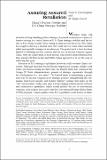| dc.contributor.author | Fravel, M. Taylor | |
| dc.contributor.author | Cunningham, Fiona Stephanie | |
| dc.date.accessioned | 2016-03-01T21:06:16Z | |
| dc.date.available | 2016-03-01T21:06:16Z | |
| dc.date.issued | 2015-11 | |
| dc.identifier.issn | 0162-2889 | |
| dc.identifier.issn | 1531-4804 | |
| dc.identifier.uri | http://hdl.handle.net/1721.1/101390 | |
| dc.description.abstract | Whether China will abandon its long-standing nuclear strategy of assured retaliation for a first-use posture will be a critical factor in future U.S.-China strategic stability. In the past decade, advances in U.S. strategic capabilities, especially missile defenses and enhanced long-range conventional strike capacity, could undermine China's nuclear retaliatory capability, which is based on a relatively small force and second-strike posture. An exhaustive review of Chinese writings on military affairs indicates, however, that China is unlikely to abandon its current nuclear strategy of assured retaliation. Instead, China will modestly expand its arsenal, increase the sophistication of its forces, and allow limited ambiguity regarding its pledge not to use nuclear weapons first. This limited ambiguity allows China to use the threat of nuclear retaliation to deter a conventional attack on its nuclear arsenal, without significantly increasing the size of its nuclear forces and triggering a costly arms race. Nevertheless, China's effort to maintain its strategy of assured retaliation while avoiding an arms race could backfire. Those efforts increase the risk that nuclear weapons could be used in a crisis between the United States and China, even though China views this possibility as much less likely than the United States does. | en_US |
| dc.description.sponsorship | Smith Richardson Foundation | en_US |
| dc.description.sponsorship | United States Institute of Peace | en_US |
| dc.language.iso | en_US | |
| dc.publisher | MIT Press | en_US |
| dc.relation.isversionof | http://dx.doi.org/10.1162/ISEC_a_00215 | en_US |
| dc.rights | Article is made available in accordance with the publisher's policy and may be subject to US copyright law. Please refer to the publisher's site for terms of use. | en_US |
| dc.source | Fravel | en_US |
| dc.title | Assuring Assured Retaliation: China's Nuclear Posture and U.S.-China Strategic Stability | en_US |
| dc.type | Article | en_US |
| dc.identifier.citation | Cunningham, Fiona S., and M. Taylor Fravel. “Assuring Assured Retaliation: China’s Nuclear Posture and U.S.-China Strategic Stability.” International Security 40, no. 2 (October 2015): 7–50. © 2015 by the President and Fellows of Harvard College and the Massachusetts Institute of Technology | en_US |
| dc.contributor.department | Massachusetts Institute of Technology. Department of Political Science | en_US |
| dc.contributor.approver | Fravel, M. Taylor | en_US |
| dc.contributor.mitauthor | Cunningham, Fiona Stephanie | en_US |
| dc.contributor.mitauthor | Fravel, M. Taylor | en_US |
| dc.relation.journal | International Security | en_US |
| dc.eprint.version | Final published version | en_US |
| dc.type.uri | http://purl.org/eprint/type/JournalArticle | en_US |
| eprint.status | http://purl.org/eprint/status/PeerReviewed | en_US |
| dspace.orderedauthors | Cunningham, Fiona S.; Fravel, M. Taylor | en_US |
| dc.identifier.orcid | https://orcid.org/0000-0002-5831-8949 | |
| dc.identifier.orcid | https://orcid.org/0000-0001-8756-0008 | |
| mit.license | PUBLISHER_POLICY | en_US |
| mit.metadata.status | Complete | |
